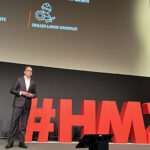
Dr. Fabian Bause, Product Manager, Beckhoff Automation, speaks to the assembled media.
At the official Press Preview for the 2024 Hannover Messe tradeshow this week, Dr. Fabian Bause, Product Manager, Beckhoff Automation GmbH & Co. KG was the keynote speaker, discussing how AI in automation is something that will affect the entire manufacturing process.
Bause noted that AI is simply a tool that can be used to automate processes, software, or machines. And he said automation is a key driver for a sustainable economy, from productivity and supply security to resource optimization.
As an example, he noted how AI can be used to optimize energy production in the wind industry. Users are looking into whether AI processed can predict wind patterns — is it possible to predict wind patterns several meters upstream and then that data it to optimize the turbine’s uptime? He said that AI can allow the examination of the interplay between turbines within a wind farm. Thus, users could then maximize the output from the whole farm; under an AI derived solution, maybe one particular turbine might generate 1% less energy while three others each produce 3% greater energy. This type of computation would have been very difficult in the past, but AI can make these solutions possible.
Bause said that, looking back to the 2019 edition of Hannover Messe, automation mainly affected blue collar workers. But today, with AI’s input, it affects everybody — and white-collar workers in particular are heavily impacted (in automation as well as in every other domain). He noted that generative AI is making inroads in everything from engineering to support.
His forecast for Hannover Messe 2024 includes:
- More industrial-grade Al hardware: more computing power for Al on the shop floor.
- Further democratization of Al tools: easy-to-use tools for tailoring individual industrial Al applications.
- More GenAl products and services: consolidation of agents and tools, increased robustness, and more base large language models (LLMs).
Excitement for April
Stefan Ziegler, from Beckhoff’s marketing communications department in Germany, explained that the company’s focus at the 2024 Hannover Messe will be focused on the broad range of products they have, “which means I/O terminals, software, of course, motion technology.”

Beckhoff’s C6043 ultra-compact industrial PC.
One product on display here was the company’s C6043 ultra-compact industrial PC. Ziegler noted the second board level on the PC, used for an NVIDIA graphics processing unit, making it useful for high-intensity computing tasks.
A company release explained that this makes it suitable as a central control unit for challenging applications, e.g. applications that place high demands on 3D graphics or with deeply integrated vision and AI program modules with minimal cycle times. The TwinCAT 3 automation software can map these functions fully integrated alongside the classic controller, without additional software or interfaces. With the additional freely assignable PCIe compact module slot, the C6043 can also be flexibly expanded with additional interfaces. The product’s power supply and cooling system provide enough power to fully exploit the potential of the external graphics card and the latest Intel processors.
Ziegler also explained that sustainability is a big issue for Beckhoff.
“There are two parts to it. First, we have a lot of photovoltaics on our buildings — we are looking for efficiency in the production that we need, while using not as much energy as last year. And second is with the product range itself,” he said. “Automation technology is a basis to reduce the need for energy and raw material in the production — and this is the goal. With increased populations, there will be a bigger need for everything from food to pharmaceuticals. And we have to produce these with less energy and less raw materials.”
You may also like:
Filed Under: NEWS • PROFILES • EDITORIALS, Commentaries • insights • Technical thinking, Green engineering • renewable energy • sustainability








